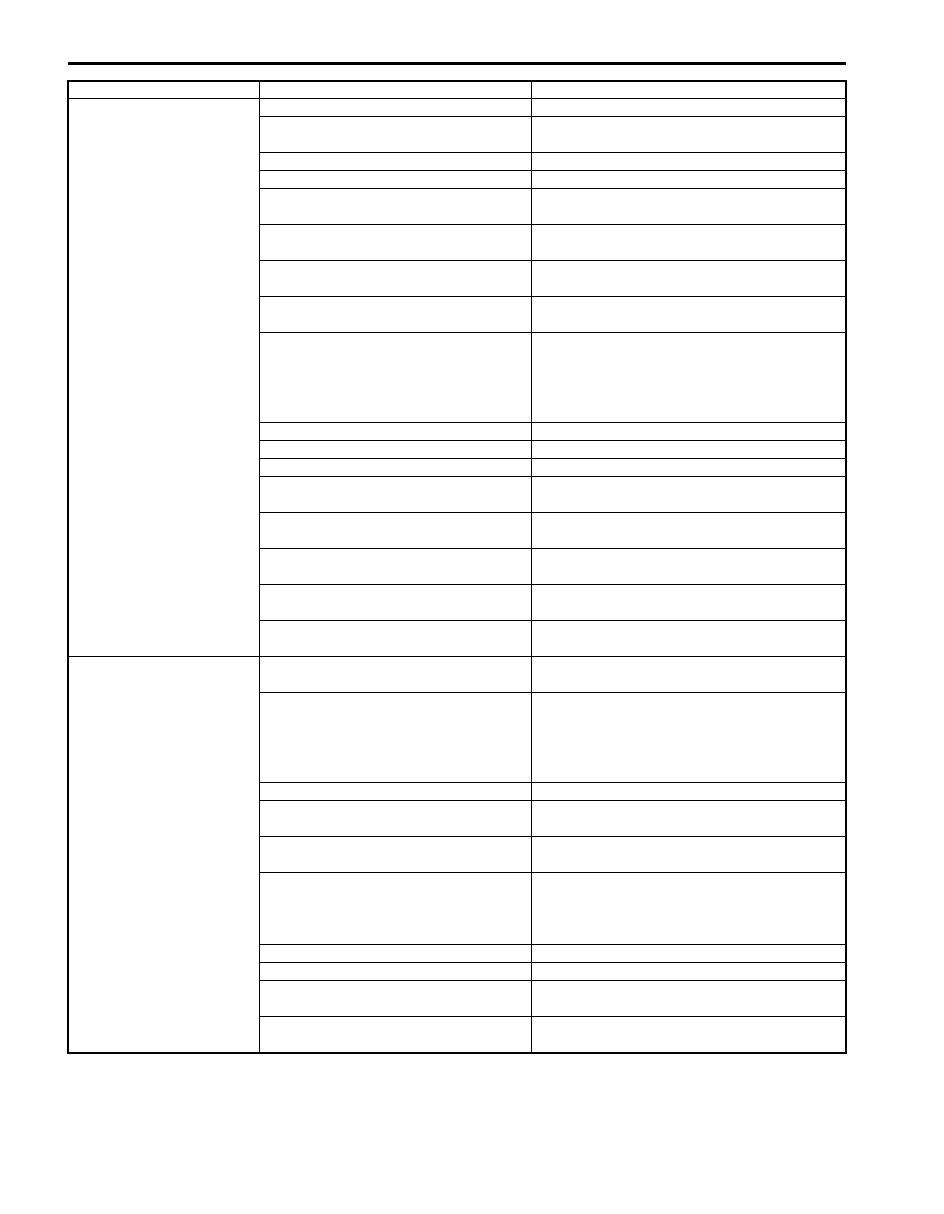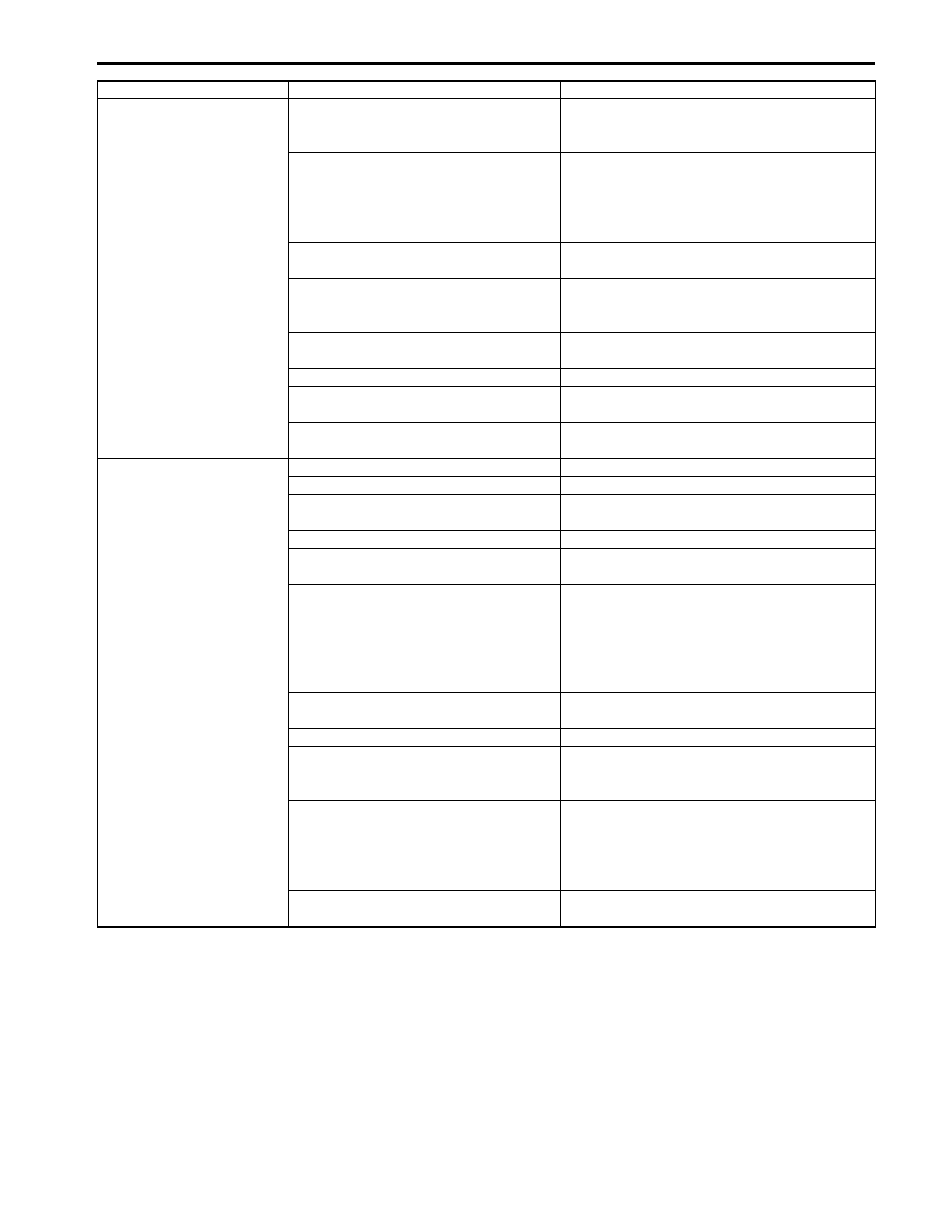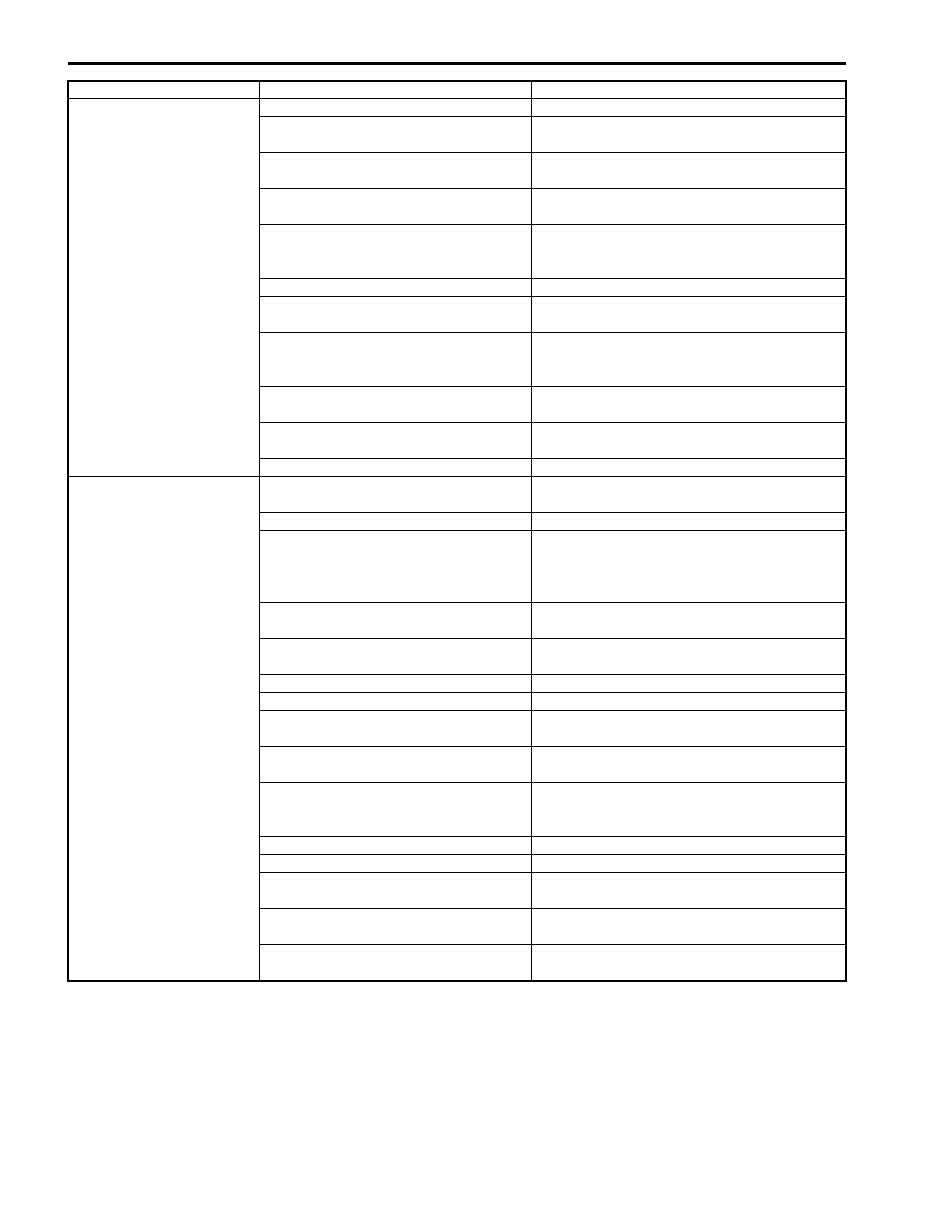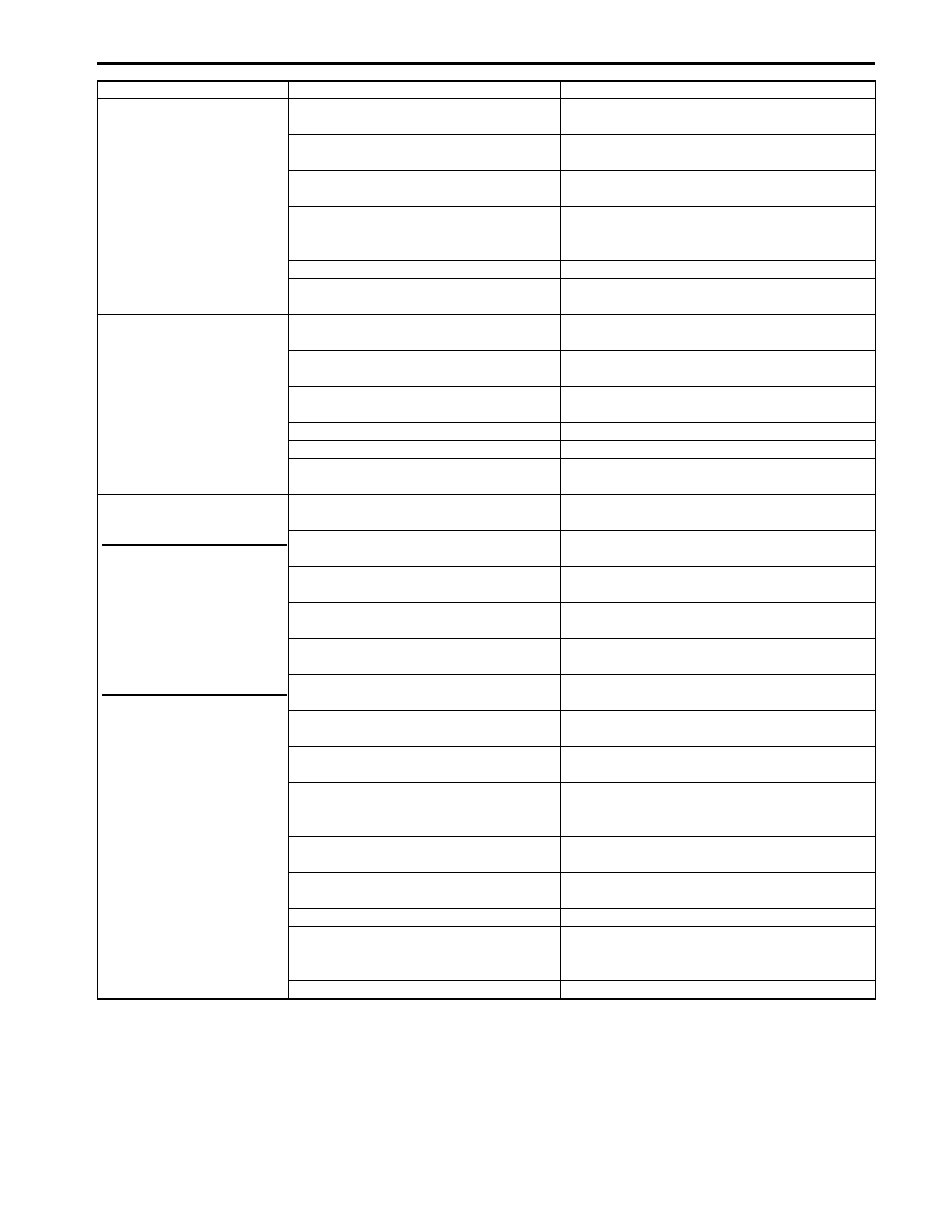Suzuki Grand Vitara JB627. Manual — part 26

1A-53 Engine General Information and Diagnosis:
Improper engine idling or
engine fails to idle
Faulty spark plug
Refer to “Spark Plug Inspection in Section 1H”.
Faulty ignition coil with ignitor
Refer to “Ignition Coil Assembly (Igniter and
Ignition Coil) Inspection in Section 1H”.
Fuel pressure out of specification
Refer to “Fuel Pressure Check”.
Engine overheating
Refer to condition of “Overheating”.
Faulty Idle air flow malfunction
Refer to “Idle Speed and IAC Throttle Valve
Opening Inspection”.
Faulty evaporative emission control
system
Refer to “EVAP Canister Purge Valve and Its
Circuit Inspection in Section 1B”.
Faulty EGR system (if equipped)
Refer to “EGR System Inspection (If Equipped)
in Section 1B”.
Faulty injector
Refer to “Fuel Injector Inspection in Section
1G”.
Faulty ECT sensor or MAF sensor
Refer to or “Engine Coolant Temperature
(ECT) Sensor Inspection in Section 1C” or
“Mass Air Flow (MAF) and Intake Air
Temperature (IAT) Sensor On-Vehicle
Inspection in Section 1C”.
Faulty ECM
Refer to “Inspection of ECM and Its Circuits”.
Low compression
Refer to “Compression Check in Section 1D”.
Malfunctioning PCV valve
Refer to “PCV Valve Inspection in Section 1B”.
Leaky intake manifold, throttle body or
cylinder head gasket
Check air intake system.
Faulty electric throttle body assembly
Refer to “Electric Throttle Body Assembly On-
Vehicle Inspection in Section 1C”.
Faulty accelerator pedal position (APP)
sensor assembly
Refer to “Accelerator Pedal Position (APP)
Sensor Assembly Inspection in Section 1C”.
Loose connection or disconnection of
vacuum hoses
Check connection or disconnection of vacuum
hoses
Faulty electric load parts (headlight,
blower motor and/or rear defogger)
Refer to “Electric Load Signal Circuit Check”.
Engine hesitates
(Momentary lack of
response as the
accelerator is depressed.
Can occur at all vehicle
speeds. Usually most
severe when first trying to
make the vehicle move, as
from a stop sign.)
Spark plug faulty or plug gap as out of
adjustment
Refer to “Spark Plug Inspection in Section 1H”.
Fuel pressure out of specification
– Dirty fuel filter
– Dirty or clogged fuel hose or pipe
– Faulty fuel pressure regulator
– Faulty fuel pump
Refer to “Fuel Pressure Check”.
Engine overheating
Refer to condition of “Overheating”.
Faulty EGR system (if equipped)
Refer to “EGR System Inspection (If Equipped)
in Section 1B”.
Faulty injector
Refer to “Fuel Injector Inspection in Section
1G”.
Faulty ECT sensor or MAF sensor
Refer to “Engine Coolant Temperature (ECT)
Sensor Inspection in Section 1C” or “Mass Air
Flow (MAF) and Intake Air Temperature (IAT)
Sensor On-Vehicle Inspection in Section 1C”.
Faulty ECM
Refer to “Inspection of ECM and Its Circuits”.
Low compression
Refer to “Compression Check in Section 1D”.
Faulty electric throttle body assembly
Refer to “Electric Throttle Body Assembly On-
Vehicle Inspection in Section 1C”.
Faulty accelerator pedal position (APP)
sensor assembly
Refer to “Accelerator Pedal Position (APP)
Sensor Assembly Inspection in Section 1C”.
Condition
Possible cause
Correction / Reference Item

Engine General Information and Diagnosis: 1A-54
Surges
(Engine power variation
under steady throttle or
cruise. Feels like the
vehicle speeds up and
down with no change in
the accelerator pedal.)
Defective spark plug (excess carbon
deposits, improper gap, and burned
electrodes, etc.)
Refer to “Spark Plug Inspection in Section 1H”.
Variable fuel pressure
– Dirty fuel filter
– Dirty or clogged fuel hose or pipe
– Faulty fuel pressure regulator
– Faulty fuel pump
Refer to“Fuel Pressure Check”.
Faulty EGR system (if equipped)
Refer to “EGR System Inspection (If Equipped)
in Section 1B”.
Faulty MAF sensor
Refer to “Mass Air Flow (MAF) and Intake Air
Temperature (IAT) Sensor On-Vehicle
Inspection in Section 1C”.
Faulty injector
Refer to “Fuel Injector Inspection in Section
1G”.
Faulty ECM
Refer to “Inspection of ECM and Its Circuits”.
Faulty electric throttle body assembly
Refer to “Electric Throttle Body Assembly On-
Vehicle Inspection in Section 1C”.
Faulty accelerator pedal position (APP)
sensor assembly
Refer to “Accelerator Pedal Position (APP)
Sensor Assembly Inspection in Section 1C”.
Excessive detonation
(The engine makes sharp
metallic knocks that
change with throttle
opening. Sounds like pop
corn popping.)
Engine overheating
Refer to condition of “Overheating”.
Faulty spark plug
Refer to “Spark Plug Inspection in Section 1H”.
Improper ignition timing
Refer to “Ignition Timing Inspection in Section
1H”.
Clogged fuel filter and fuel lines
Refer to “Fuel Pressure Check”.
Faulty EGR system (if equipped)
Refer to “EGR System Inspection (If Equipped)
in Section 1B”.
Faulty knock sensor, ECT sensor or
MAF sensor
Refer to “DTC P0327 / P0328: Knock Sensor
Circuit Low / High”, “Engine Coolant
Temperature (ECT) Sensor Inspection in
Section 1C” or “Mass Air Flow (MAF) and
Intake Air Temperature (IAT) Sensor On-
Vehicle Inspection in Section 1C”.
Faulty injector
Refer to “Fuel Injector Inspection in Section
1G”.
Faulty ECM
Refer to “Inspection of ECM and Its Circuits”.
Excessive combustion chamber
deposits
Refer to “Cylinder Head Inspection in Section
1D” and “Cylinders, Pistons and Piston Rings
Inspection in Section 1D”.
Fuel pressure out of specification
– Dirty fuel filter
– Dirty or clogged fuel hose or pipe
– Faulty fuel pressure regulator
– Faulty fuel pump
Refer to “Fuel Pressure Check”.
Air drawn in through intake manifold or
throttle body gasket
Check air intake system.
Condition
Possible cause
Correction / Reference Item

1A-55 Engine General Information and Diagnosis:
Overheating
Inoperative thermostat
Refer to “Thermostat Inspection in Section 1F”.
Poor water pump performance
Refer to “Water Pump Inspection in Section
1F”.
Clogged or leaky radiator
Refer to “Radiator On-Vehicle Inspection and
Cleaning in Section 1F”.
Improper engine oil grade
Refer to “Engine Oil and Filter Change in
Section 0B”.
Clogged oil filter or oil strainer
Refer to “Engine Oil and Filter Change in
Section 0B” or “Oil Pan and Oil Pump Strainer
Cleaning in Section 1E”.
Poor oil pump performance
Refer to “Oil Pump Inspection in Section 1E”.
Dragging brakes
Refer to condition: “Dragging brakes” in
“Brakes Symptom Diagnosis in Section 4A”.
Slipping clutch
Refer to condition: “Slipping clutch” in “Clutch
(Hydraulic Type) Symptom Diagnosis in
Section 5C”.
Blown cylinder head gasket
Refer to “Cylinder Head Inspection in Section
1D”.
Faulty radiator cooling fan control
system
Refer to “DTC P0480 / P0481 / P0482: Fan 1 /
Fan 2 / Fan 3 Control Circuit”.
Air mixed in cooling system
Release air from cooling system.
Poor gasoline mileage
Faulty spark plug (improper gap, heavy
deposits, and burned electrodes, etc.)
Refer to “Spark Plug Inspection in Section 1H”.
Fuel pressure out of specification
Refer to “Fuel Pressure Check”.
Faulty ECT sensor or MAF sensor
Refer to “Engine Coolant Temperature (ECT)
Sensor Inspection in Section 1C” or “Mass Air
Flow (MAF) and Intake Air Temperature (IAT)
Sensor On-Vehicle Inspection in Section 1C”.
Faulty EGR system (if equipped)
Refer to “EGR System Inspection (If Equipped)
in Section 1B”.
Faulty injector
Refer to “Fuel Injector Inspection in Section
1G”.
Faulty ECM
Refer to “Inspection of ECM and Its Circuits”.
Low compression
Refer to “Compression Check in Section 1D”.
Poor valve seating
Refer to “Valves and Valve Guides Inspection
in Section 1D”.
Dragging brakes
Refer to condition: “Dragging brakes” in
“Brakes Symptom Diagnosis in Section 4A”.
Slipping clutch
Refer to condition: “Slipping clutch” in “Clutch
(Hydraulic Type) Symptom Diagnosis in
Section 5C”.
Thermostat out of order
Refer to “Thermostat Inspection in Section 1F”.
Improper tire pressure
Adjust tire pressure.
High idle speed
Refer to “Improper engine idling or engine fails
to idle” under “Engine Symptom Diagnosis”.
Faulty electric throttle body assembly
Refer to “Electric Throttle Body Assembly On-
Vehicle Inspection in Section 1C”.
Faulty accelerator pedal position (APP)
sensor assembly
Refer to “Accelerator Pedal Position (APP)
Sensor Assembly Inspection in Section 1C”.
Condition
Possible cause
Correction / Reference Item

Engine General Information and Diagnosis: 1A-56
Excessive engine oil
consumption
Sticky piston ring
Refer to “Cylinders, Pistons and Piston Rings
Inspection in Section 1D”.
Worn piston and cylinder
Refer to “Cylinders, Pistons and Piston Rings
Inspection in Section 1D”.
Worn piston ring groove and ring
Refer to “Cylinders, Pistons and Piston Rings
Inspection in Section 1D”.
Improper location of piston ring gap
Refer to “Pistons, Piston Rings, Connecting
Rods and Cylinders Disassembly and
Reassembly in Section 1D”.
Worn or damaged valve stem seal
Replace.
Worn valve stem
Refer to “Valves and Valve Guides Inspection
in Section 1D”.
Low oil pressure
Improper oil viscosity
Refer to “Engine Oil and Filter Change in
Section 0B”.
Malfunctioning oil pressure switch
Refer to “Oil Pressure Switch Inspection in
Section 9C”.
Clogged oil strainer
Refer to “Oil Pan and Oil Pump Strainer
Cleaning in Section 1E”.
Functional deterioration of oil pump
Refer to “Oil Pump Inspection in Section 1E”.
Worn oil pump relief valve
Refer to “Oil Pump Inspection in Section 1E”.
Excessive clearance in various sliding
parts
Engine noise
NOTE
Before checking the
mechanical noise, make
sure that:
• Ignition timing.
• Specified spark plug is
used.
• Specified fuel is used.
Improper valve lash
Refer to “Valve Lash (Clearance) Inspection in
Section 1D”.
Worn valve stem and guide
Refer to “Valves and Valve Guides Inspection
in Section 1D”.
Weak or broken valve spring
Refer to “Valve Springs Inspection in Section
1D”.
Warped or bent valve
Refer to “Valves and Valve Guides Inspection
in Section 1D”.
Loose camshaft housing bolts
Refer to “Camshafts, Tappets and Shims
Removal and Installation in Section 1D”.
Worn piston, ring and cylinder bore
Refer to “Cylinders, Pistons and Piston Rings
Inspection in Section 1D”.
Worn crank pin bearing
Refer to “Crank Pins and Connecting Rod
Bearings Inspection in Section 1D”.
Worn crank pin or connecting rod
bearings
Refer to “Crank Pins and Connecting Rod
Bearings Inspection in Section 1D”.
Loose connecting rod nuts
Refer to “Pistons, Piston Rings, Connecting
Rods and Cylinders Removal and Installation
in Section 1D”.
Low oil pressure
Refer to condition “Low oil pressure” previously
described.
Worn crankshaft journal bearing
Refer to “Main Bearings Inspection in Section
1D”.
Worn crankshaft journal
Refer to “Crankshaft Inspection in Section 1D”.
Loose lower crankcase (bearing cap)
bolts
Refer to “Main Bearings, Crankshaft and
Cylinder Block Removal and Installation in
Section 1D”.
Excessive crankshaft thrust play
Refer to “Crankshaft Inspection in Section 1D”.
Condition
Possible cause
Correction / Reference Item

Нет комментариевНе стесняйтесь поделиться с нами вашим ценным мнением.
Текст